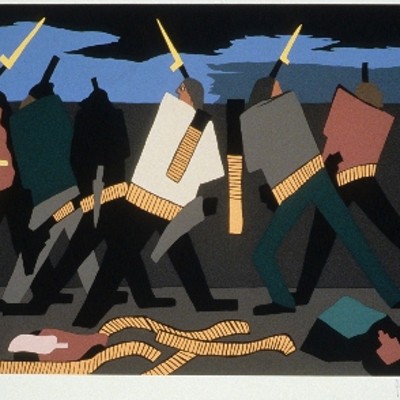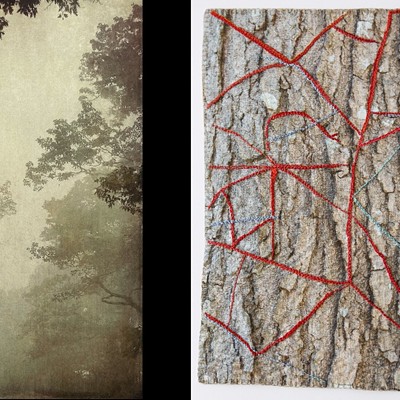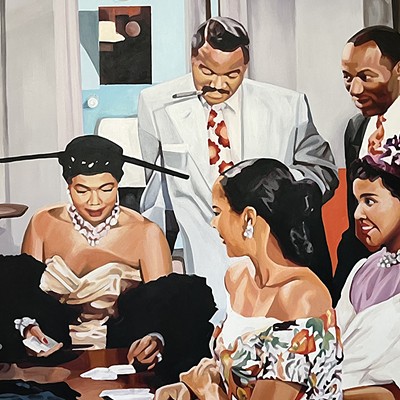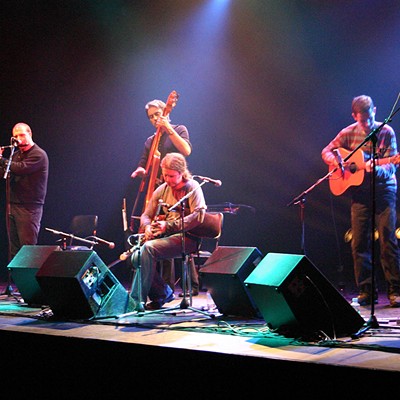He and co-author Sherilyn Meece Mentes are methodically signing copies of their new book, Lalo: My Life and Music, piles of which cover every inch of a large table and spill out onto the floor. But the 85-year-old Guerrero is unfazed by the Sisyphean task. Elegantly dressed in a sharp gray tie, dress shirt and gray pants, he leaps to his feet to greet his fifth interviewer of the day, and kisses her on the hand. Showing a bit of the raunch he once upon a time displayed in his Los Angeles nightclub, he jokes that he's got lots more to do before the day is done, exclaiming, "I brought my Viagra with me!"
Officially named a National Treasure by the Smithsonian and unofficially acknowledged as a Local Treasure here in his hometown (his photo appears prominently on the Broadway underpass mural), Guerrero will be in Tucson this weekend to play some of the crossover Latin swing that made his name back in the '40s and '50s. He teams up Sunday at St. Philip's Plaza for a concert with local Latin jazz musician Ismael Barajas and Skip Heller of Los Angeles, a bandleader who dips into everything from jazz to klezmer.
Meantime, Guerrero's got a book to promote, and he does the job with an unending stream of stories.
For instance, he recounts that back in '96, when President Clinton awarded him the National Medal of Arts for his achievements in music, he was on a stage with the likes of Lionel Hampton, Stephen Sondheim, Maurice Sendak and Robert Redford.
"Everybody got a medal," Guerrero remembers with relish. "The president and Mrs. Clinton came and shook my hand, but the president was turning around. I thought I wasn't going to get my picture taken. I grabbed Mrs. Clinton; I grabbed her arm. The president turned around and said, 'This old guy still has plenty of salsa.'" Guerrero laughs with pleasure at the memory of out-salsa-ing a president who had plenty of his own. "It was the only laugh of the day."
The musician's fondest stories are about his childhood in Tucson's Barrio Viejo, where he was born in a house at the corner of Simpson and Convent on Christmas Eve 1916. Long before Guerrero performed the twin feat of bringing Mexican music to the American masses and bringing swing to música mexicana, Lalo was a poor kid on the poor side of town. His mother, Concepción, gave birth to 18 children, only 11 of whom lived past their first birthday. His dad, Eduardo Guerrero Ramirez, for whom he is named, worked as a boilermaker for the Southern Pacific Railroad.
"My dad would get paid every two weeks," his son says. "He was a skilled worker but we'd run out of money. We had credit with a Chinese grocer. We'd buy what we wanted and he'd write it down. At the end of 15 days when my dad would get his check, we paid. Most of the Mexican families did that."
Likely, however, it was only the Guerrero dog that ran a tab at the store. "We had a dog, Brownie. He was so smart. There was a certain kind of dog food he liked; it had a red heart on the can. When Brownie got hungry, he would go straight to the store and put the can in his mouth. The Chinese man would write it down. Brownie went over there whenever he wanted."
If the Brownie story sounds suspiciously like a tall tale, it follows in the tradition of Guerrero's innumerable comic stories of Mexican-American life rendered in song. He has penned everything from a lament for a lack of tortillas ("I love tortillas and I love them dearly, / You'll never know just how sincerely") to "Pancho Claus," a hilarious Chicano version of the St. Nick story.
Yet some of Guerrero's Tucson tales are much darker. He and a sister both got smallpox as children, and they were so badly pockmarked that the kids at Drachman School taunted them with cries of "cacaro" (scarface). Mexican-Americans were relegated to the balconies of the Lyric and Plaza movie theaters, he remembers, and while the teachers at Tucson High treated their students fairly, a couple of his fellow students were "real bigots."
Still, the rich musical ferment in the old neighborhood gave him his start as a musician. "When it came to music, I was like a funnel," Guerrero writes. His mother would sing and dance with castanets in the family living room, and she eventually taught her son guitar. He credits Miss Davis, his fifth-grade teacher at Drachman, with "open(ing) up the world of classical music to me." Mexican rancheras, corridos and norteño wafted in by radio, and a black nightclub called The Beehive, just a few blocks away from his home, taught him to love jazz and blues. By the time young Lalo was in high school, he and a couple of buddies formed a singing trio and quickly got a weekly radio program on KGAR.
Early on, Guerrero showed the versatility that would be the hallmark of his long career. "The younger people wanted American music and the older ones wanted Mexican. It didn't matter to us; we could play both kinds."
Guerrero's musical talents eventually took him to L.A., where after a few erratic years, complicated by discrimination against Mexican-Americans, he began having success. He and his buddies started out singing Mexican songs as a novelty act in Anglo clubs, but in time he became a star with best-selling records and his own nightclub, Lalo's. In his late '50s, he went into semi-retirement by taking up a singing gig at a restaurant in Palm Springs, a job that lasted 24 years.
His long career took him on a trajectory from traditional music to swing to political songs inspired by the Chicano movement. He wrote songs in support of Cesar Chavez's farmworkers (one song was "Mexican Mamas, Don't Let Your Babies Grow Up to be Busboys") and he's lasted long enough to serve as mentor to Los Lobos, a younger-generation band. He's delighted that young Europeans are now delving into his music. "I got a check for $1,700 the other day," he beams. "They're royalties from Germany, Russia and Italy."
Midway through his 80s, the affable Guerrero has no plans to stop playing. "I'm going to keep on going until I can't go anywhere," he declares. "When I can't anymore I'll stay home and enjoy TV."
A song eulogizing the lost barrio of his youth brought him together with his co-author, Mentes. "I was so happy in that neighborhood," he says. "It was our own little world." After the urban renewal projects of the late '60s leveled the Mexican-American neighborhood in the heart of Tucson, he composed "Barrio Viejo." Written in Spanish, the song begins, "Viejo barrio, old neighborhood, / There are only empty spaces / Where once there were homes / Where once our people lived."
Mentes, a California filmmaker, heard the song when she was researching another urban renewal desecration in California. "I had never heard of his music," she explains, but she tracked him down to Palm Springs. A book was born when "he started telling me the stories behind the songs."
Nowadays, on tour, Mentes looks after Guerrero, telling him it's time to leave off the tales and go put his feet up before the evening interviews commence. Guerrero resists her ministrations. He stands up to put his coat on, but he complains good-naturedly, "Not only is she the expert on my life, now she's my boss." But he likes the book they've put together. "She's more of a writer," he concedes.
Mentes has the last word. "And he's a talker."











